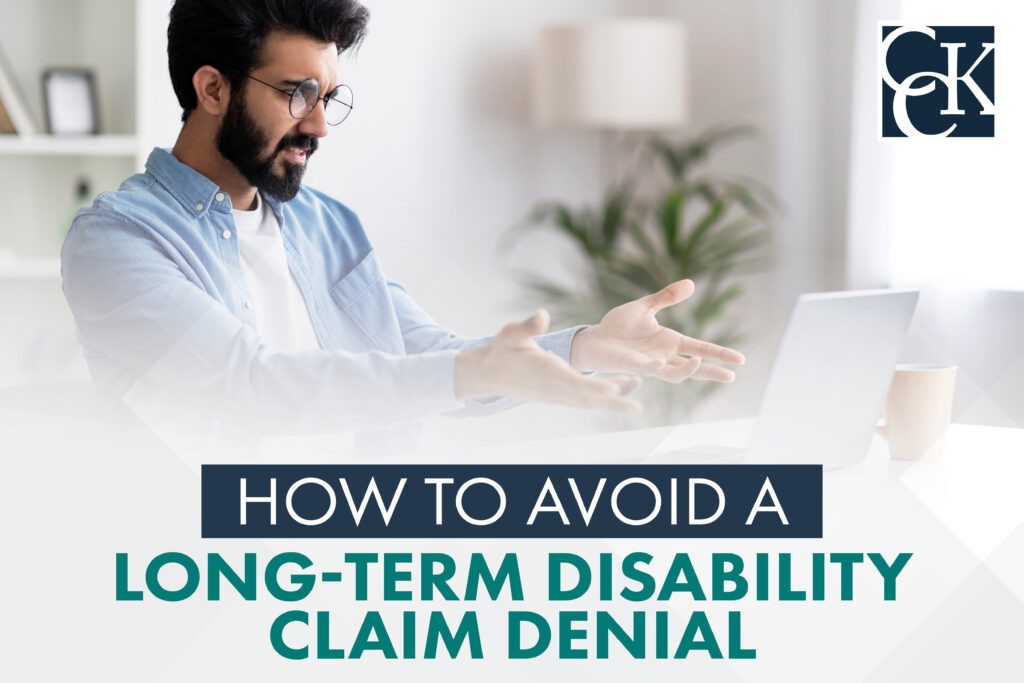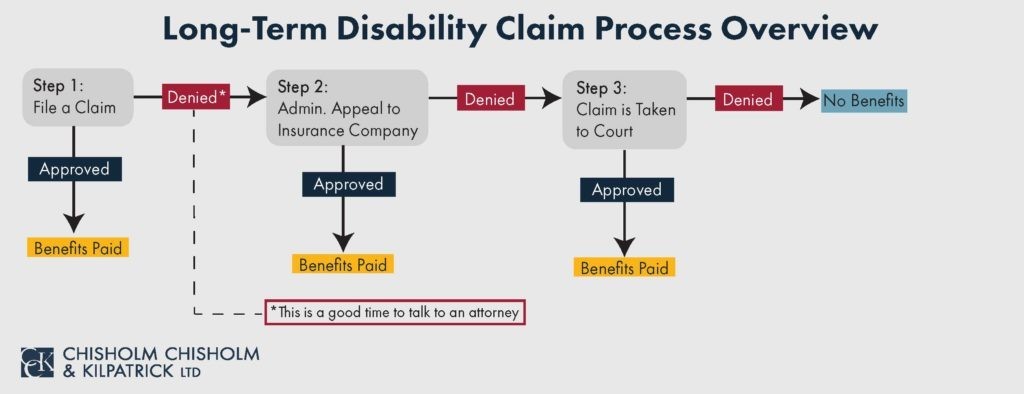How to Avoid a Long-Term Disability Claim Denial

In today’s world, it is unfortunately not uncommon for working professionals to find themselves suffering from a debilitating medical condition. As such, many professionals have long-term disability (LTD) insurance, either through their employer or bought directly from an insurance company.
These benefits protect all or a portion of a person’s income when they become unable to work due to their condition. The process of filing an initial claim is a daunting task, and the prospect of receiving a claim denial is real as insurance companies issue many LTD denials each year.
However, there are steps you can take during your initial claim to try and help avoid receiving such a denial. Read below to discover what you need to know to help avoid receiving a denial on your initial LTD claim.
Many Claimants Face Denials from Their Insurers
When you develop a medical condition that prohibits you from working, it is stressful. Your entire life can become disrupted, from waking up in the morning to doing simple, day-to-day tasks. In short, suffering from a debilitating condition can sideline both your personal life and your work life. When you cannot work, however, you still must manage your health and pay your bills. The stress can become overwhelming.

To prepare for this possibility, you should have long-term disability insurance coverage. You may have obtained this coverage either through your employer, purchased directly from an insurance company, or both.
Employer-provided coverage is usually referred to as a “group policy” and, if offered, is part of the benefit package at your place of employment. ERISA governs many group policies. Conversely, “individual policies” are those that you buy yourself directly from an insurance company; these policies are typically more flexible but often come with higher per-month premiums. It is possible to have both types of policies simultaneously.
It should be straightforward to obtain your benefits, but this is not always the reality. Filing a claim with your insurance company is arduous and time-consuming. The last thing you want is a complicated process that receives a denial. Yet many insurers deny initial claims. Insurance companies often prioritize their bottom line rather than the needs of their clients. In short, if they pay claims they lose money, so if they can ascertain a reason to issue a denial, they will.
Common Reasons Insurance Companies Deny Initial LTD Claims
Although a disability can prevent a person from working, insurance companies still often deny claims. Some of the most common reasons your insurer may cite when denying your initial claim include:
- Your initial claim did not demonstrate that you met your policy’s definition of disability
- You made a mistake on the application, such as withholding certain medical information
- Your condition falls under an exclusion in your policy
- Your initial claim was submitted beyond the deadline thereby not giving your insurer “adequate notice” of your claim
- Your claim did not have sufficient documentation or evidence, such as medical records and tests
- Insurance company surveillance purportedly revealed inconsistencies within your claim
- An insurance company’s independent medical exam (IME) concluded that your condition did not warrant LTD benefits
- You were not receiving regular treatment for your condition
When denying your claim, your insurer will send you a denial letter. This denial letter will list any reason(s) they had for denying your claim. The abovementioned reasons are some of the most common, but there can be other reasons too.

However, as a claimant, you want to avoid having to submit an appeal. So, what can you do to mitigate the odds of receiving a denial on your initial claim?
How to Try and Avoid a Denial of Your Initial Claim
It is preferable to get your LTD claim approved at the initial stage rather than having to go through an appeal. There are a few best practices you can implement when you know you must file for long-term disability benefits that can help prevent a denial.
These practices include:
- Read your LTD policy thoroughly: Your policy contains the foundation upon which you can build a successful claim. One of the most crucial elements in your policy is its definition of disability, which you must prove you meet to receive benefits. You can use this definition to help determine the best evidence to gather.
- Do not feel limited by the space provided on the claimant forms: Your claim forms may not provide a lot of space to describe your disability, but you do not need to limit your responses to this small space. It is acceptable to write something like “see attached page” and then use a separate page to fully explain your answer.
- Keep a log of all your symptoms: Keeping a daily log of all your day-to-day symptoms can help you remember details to include with your claim and can help your doctors better understand the debilitating nature of your condition.
- Request a detailed report from your doctor: Sometimes medical records are not enough on their own. It can be advantageous to request a specialized medical report from your doctor. This report can highlight certain aspects of your condition that may not be apparent in the records, explain in more detail how your condition negatively impacts your ability to work, and reinforce the strength of your claim.
- Obtain additional medical and vocational evaluations: It can also be beneficial to submit additional evaluations from outside experts as part of your claim. These evaluations constitute objective, third-party evidence, which can bolster your claim.
- Bring medical records to an IME: You should never assume your insurer will obtain and/or supply all your medical records to the doctor they hire to conduct an IME. It is best practice to bring these documents yourself. Moreover, you may also request to bring a witness to the IME, who can attest to what transpired (if needed).
- Be aware of insurance company surveillance tactics: Insurance companies often surveil claimants to find inconsistencies that they can then cite as “evidence” against the claim. It is important to use accurate, precise language when explaining your disability and to be aware of the tactics insurers use.
- Make sure you are regularly receiving medical treatment for your condition: If you are not engaged in regular treatment for your disabling condition, the insurer may deny your claim. It is important to maintain your appointments with your doctor and keep a record of them, too.
- Do not miss any deadlines: Claim deadlines can vary. Some policies may say you must submit a notice of claim within 30 days of the date your disability began, while others may say within 180 days. Either way, these deadlines are strict and if you miss them, you may lose your rights to your benefits.
By implementing these best practices at the beginning of the LTD claim process, you give yourself the best chance of receiving an approval of your claim and avoiding the appeal stage altogether.
A Long-Term Disability Attorney Can Help Strengthen Your Claim
It is a daunting task to file a long-term disability claim on your own. Some claimants, however, decide to submit their claims by themselves. While this is possible, it is not always beneficial. A long-term disability attorney can help strengthen your claim and implement the strategies necessary to obtain an approval.

Chisholm Chisholm & Kilpatrick’s LTD attorneys have over 30 years of collected experience helping claimants obtain their benefits. As such, we know how to bolster our clients’ claims, and we know what insurance companies are looking for.
Our LTD team can evaluate your policy; determine your policy’s definition of disability; determine the best evidence to collect; submit all forms, documentation, and evidence on time and on your behalf; and act as a point of contact between you and your insurer. Consulting with a long-term disability insurance lawyer is beneficial to ensure that you build the strongest possible case for your benefits.
Call CCK Today for a Free Case Evaluation
Of course, nothing is foolproof, and your insurance company may still wrongly deny your initial claim. While this may be disheartening after all the time and effort put into the initial claim, you have the right to appeal your insurer’s decision. In such situations, it is especially important to consult with an experienced long-term disability lawyer who can help you win your appeal.
CCK understands how difficult this entire process is, and we want you to focus on your health. We can help you at any stage you may be, from your initial claim through to litigation. Call CCK today at (800) 544-9144 for a free case evaluation. We can analyze your case and determine if we can assist.
About the Author
Share this Post

